2023年江西中考英语复习 专题九 情态动词课件(共32张PPT)
文档属性
| 名称 | 2023年江西中考英语复习 专题九 情态动词课件(共32张PPT) |  | |
| 格式 | ppt | ||
| 文件大小 | 460.5KB | ||
| 资源类型 | 教案 | ||
| 版本资源 | 人教新目标(Go for it)版 | ||
| 科目 | 英语 | ||
| 更新时间 | 2023-06-11 06:50:35 | ||
图片预览

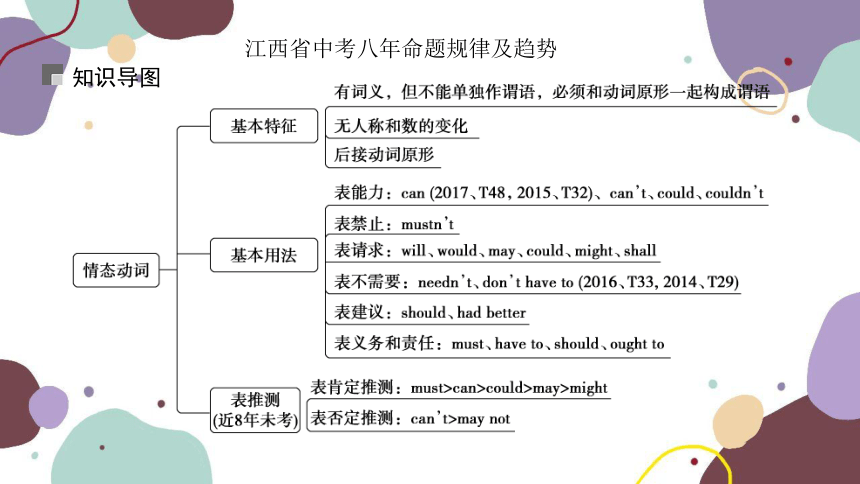

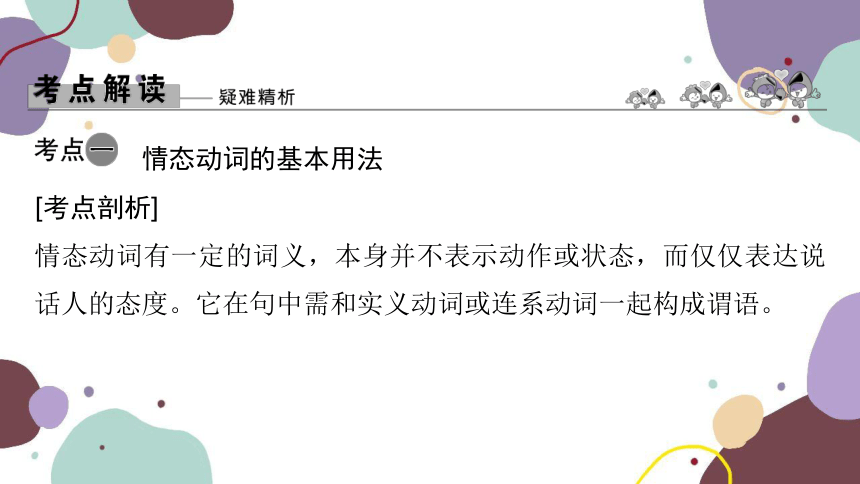
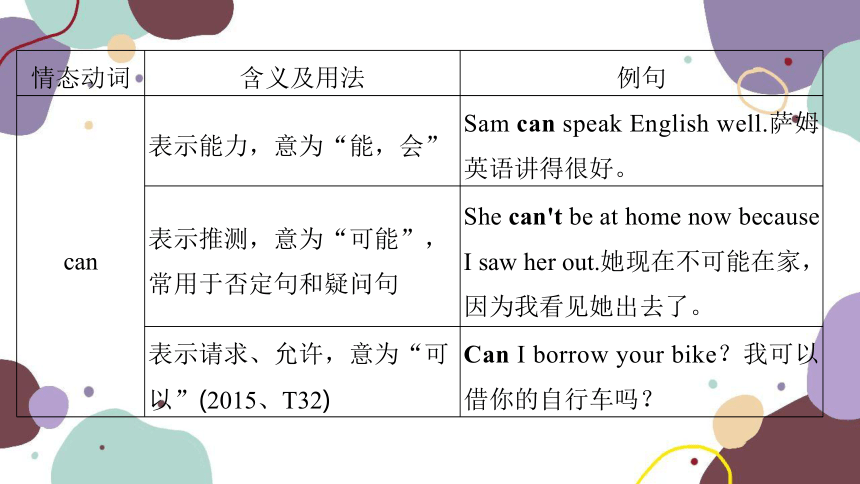
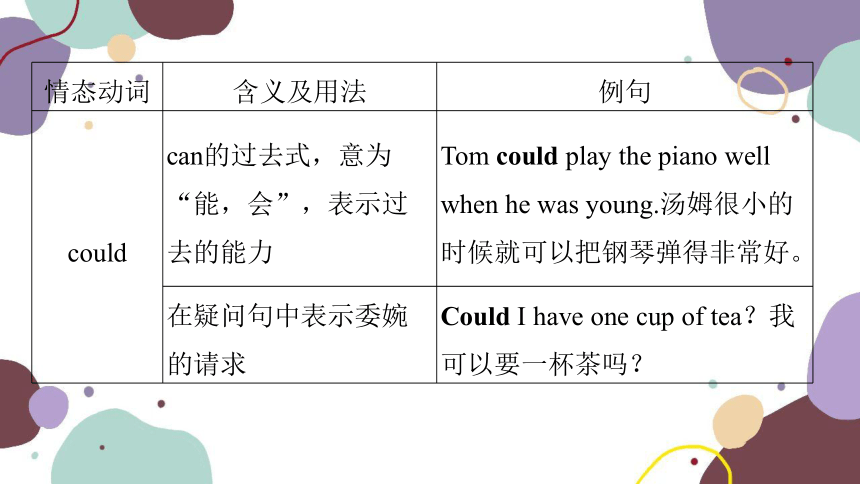
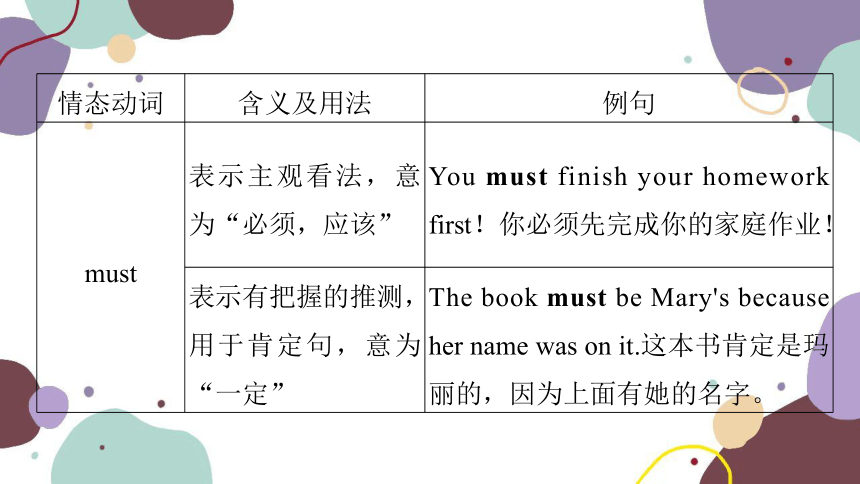
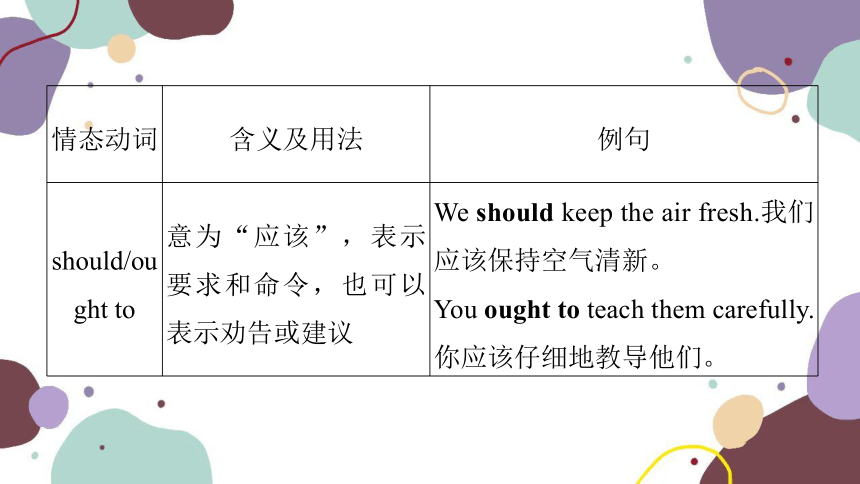
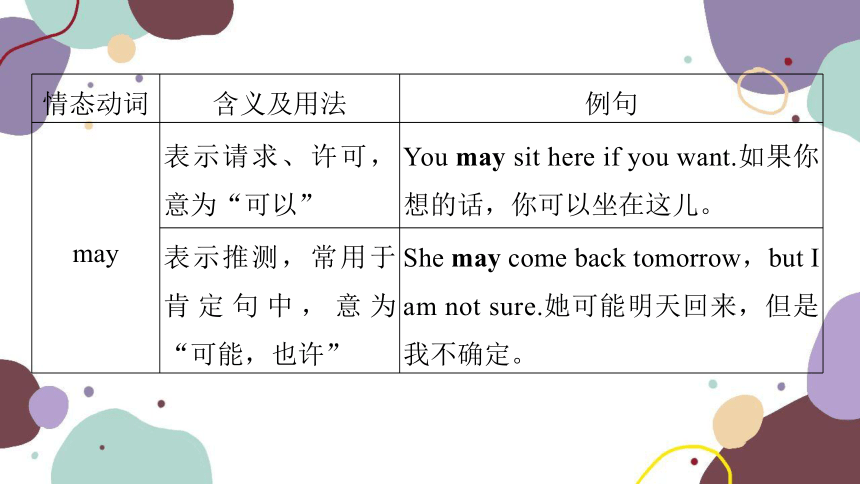
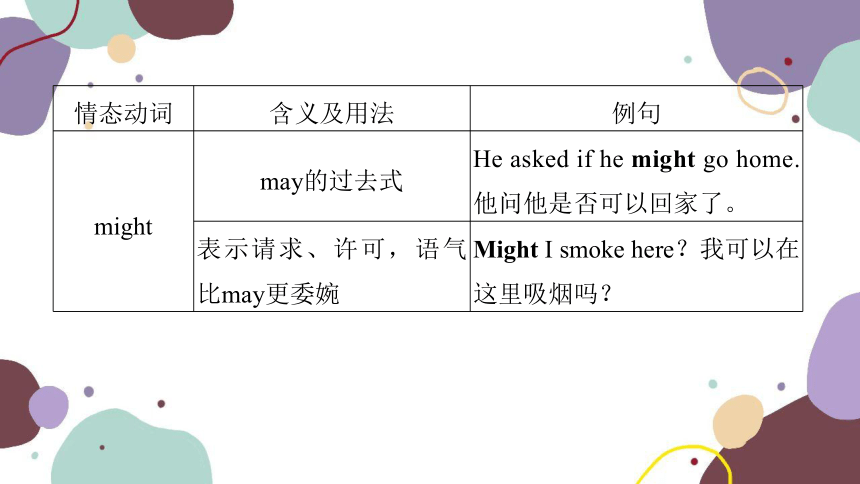
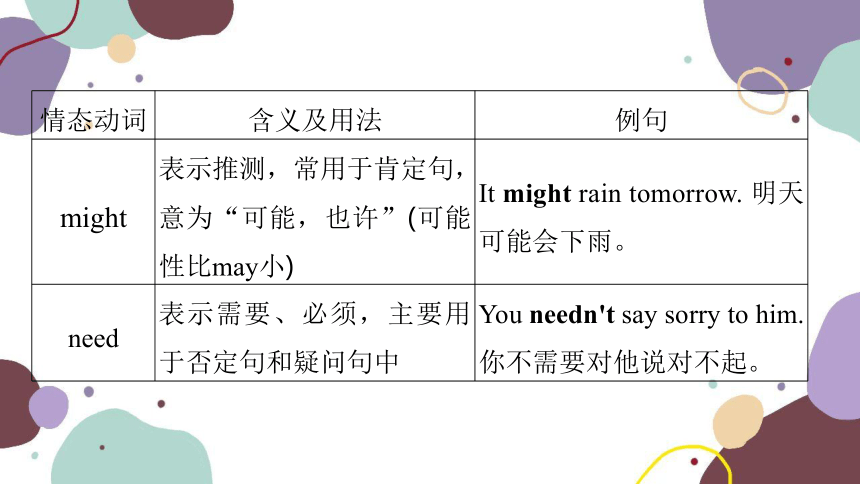
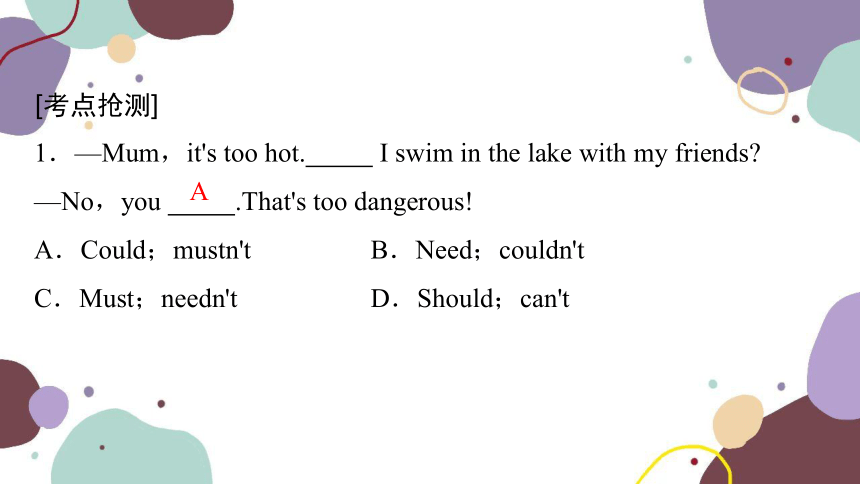
文档简介
(共32张PPT)
专题九 情态动词
知识导图
江西省中考八年命题规律及趋势
中考预测
从近八年江西中考来看,情态动词是考查的一个重点。单项填空和完形填空A主要考查根据特定语境来辨析情态动词的意思从而选择适当的情态动词。但中考对情态动词的考查贯穿于各个题型中,如完形填空B中常考查情态动词接动词原形这一用法。
情态动词的基本用法
[考点剖析]
情态动词有一定的词义,本身并不表示动作或状态,而仅仅表达说话人的态度。它在句中需和实义动词或连系动词一起构成谓语。
情态动词 含义及用法 例句
can 表示能力,意为“能,会” Sam can speak English well.萨姆英语讲得很好。
表示推测,意为“可能”,常用于否定句和疑问句 She can't be at home now because I saw her out.她现在不可能在家,因为我看见她出去了。
表示请求、允许,意为“可以”(2015、T32) Can I borrow your bike?我可以借你的自行车吗?
情态动词 含义及用法 例句
could can的过去式,意为“能,会”,表示过去的能力 Tom could play the piano well when he was young.汤姆很小的时候就可以把钢琴弹得非常好。
在疑问句中表示委婉的请求 Could I have one cup of tea?我可以要一杯茶吗?
情态动词 含义及用法 例句
must 表示主观看法,意为“必须,应该” You must finish your homework first!你必须先完成你的家庭作业!
表示有把握的推测,用于肯定句,意为“一定” The book must be Mary's because her name was on it.这本书肯定是玛丽的,因为上面有她的名字。
情态动词 含义及用法 例句
should/ought to 意为“应该”,表示要求和命令,也可以表示劝告或建议 We should keep the air fresh.我们应该保持空气清新。
You ought to teach them carefully.你应该仔细地教导他们。
情态动词 含义及用法 例句
may 表示请求、许可,意为“可以” You may sit here if you want.如果你想的话,你可以坐在这儿。
表示推测,常用于肯定句中,意为“可能,也许” She may come back tomorrow,but I am not sure.她可能明天回来,但是我不确定。
情态动词 含义及用法 例句
might may的过去式 He asked if he might go home.他问他是否可以回家了。
表示请求、许可,语气比may更委婉 Might I smoke here?我可以在这里吸烟吗?
情态动词 含义及用法 例句
might 表示推测,常用于肯定句,意为“可能,也许”(可能性比may小) It might rain tomorrow. 明天可能会下雨。
need 表示需要、必须,主要用于否定句和疑问句中 You needn't say sorry to him.你不需要对他说对不起。
[考点抢测]
1.—Mum,it's too hot. I swim in the lake with my friends
—No,you .That's too dangerous!
A.Could;mustn't B.Need;couldn't
C.Must;needn't D.Should;can't
A
2.He speak English very well although he has studied it for only one year.
A.mustn't B.can't
C.must D.can
D
3.—Must I do the project on my own,Mrs.Smith
—No,you .You can work with your classmates.
A.should B.needn't
C.must D.can't
B
情态动词的其他用法
[考点剖析]
一、must和have to(2016、T33)
must表示主观上感到“有必要……”;have to表示因外部因素而使得某人“不得不……”。此外,must只有一般现在时,表示“过去”通常用had to,表示将来要用will have to。have/has/had to+动词原形,在改否定句或疑问句时要另外加助动词do/does/did。
Must I go there with you?我必须和你去那儿吗?
She has to stay at home and look after her sick mother.
她得待在家里照顾生病的妈妈。
Does she have to stay at home and look after her sick mother?她得待在家里照顾她生病的妈妈吗?
二、can和be able to
两者表“能力”时用法相同,但can只有现在式can和过去式could两种形式,其他时态要用be able to来表示。另外,be able to常常有“可做成某事”的意思。
Jim can't speak Chinese.吉姆不会说中文。
We will be able to see him next week.
下个星期,我们将会看到他。
三、should和be supposed to(2015、T32)
两者都可以表示“应该”,一般情况下可互换使用。但两者在含义上存在细微的区别。should主要出自说话人本身的判断,而be supposed to主要从外部的期望、客观的标准或事先的安排来判断,有“被期望或被要求做某事”的含义,be有人称和数的变化。
You are supposed to wear the school uniform.你应该穿校服。
四、maybe和may be
前者是副词,意为“大概,或许”,与perhaps/probably同义;后者属于情态动词,may与be动词连用,意为“或许是”。
Maybe she is in the office.或许她在办公室。
She may be in the office.她或许是在办公室。
五、can't和mustn't
can't表示非常有把握的否定推测,意为“不可能”(表非常有把握的肯定推测时用must,意为“一定”);mustn't意为“禁止,不许”,不用来表推测。
[考点抢测]
1.(2016·江西)You take me to the station.My brother's taking me.
A.can't B.mustn't
C.shouldn't D.don't have to
D
2.(2015·江西)Nathan likes his job because he enjoy the beauty of nature.
A.can B.must
C.should D.is supposed to
3.(2014·江西)We pay to get into the concert.It's free.
A.can't B.mustn't
C.might not D.don't have to
A
D
[规律总结]
分析江西近8年中考真题可知,情态动词在单项填空和完形填空A中考查了4次情态动词的基本用法,具体如下:can(2017、T48,2015、T32)、don't have to(2016、T33,2014、T29)。在选项设置上常为四个不同的情态动词,且同为肯定或否定形式。
情态动词的被动语态
[考点剖析]
含有情态动词的被动语态的结构为“情态动词+be+done(过去分
词)”。做题时要兼顾情态动词和语态这两个方面的用法。
More trees should be planted in China in order to protect the environment.在中国,为了保护环境,更多的树应该被种植。
[注意] (1)由must引出的一般疑问句,肯定回答常用must;否定回答常用needn't或don't have to。
—Must I answer the question?我必须回答这个问题吗?
—Yes,you must./No,you needn't(don't have to).是的,你必须回答。/不,你不需要。
(2)need作为实义动词有人称和数的变化,后面可接名词、代词、动名词及带to的动词不定式;可用于肯定句、疑问句和否定句中。
She doesn't need to see the doctor.She just needs a rest.
她不需要看医生,她只需要休息一下。
单项填空
1.Parents put the things like knives and medicine away in the house to keep children safe.
A.should B.can
C.may D.might
A
2.—Where is Monica I can't find her.
—She be in the library.She loves reading books when she is free.
A.must B.need
C.mustn't D.needn't
A
3. you smell something burning Go and see what's happening.
A.Can B.May
C.Must D.Need
4.You drive your car so fast.It's very dangerous.
A.wouldn't B.shouldn't
C.couldn't D.mightn't
A
B
5.There's enough time for you to go to the airport.You hurry now.
A.shouldn't B.needn't
C.mustn't D.can't
B
6.I think students follow the school rules in order to have a better learning environment.
A.need B.may
C.can D.must
D
7.The poor woman have enough money to support herself or raise her children.
A.wouldn't B.shouldn't
C.mustn't D.may not
D
专题九 情态动词
知识导图
江西省中考八年命题规律及趋势
中考预测
从近八年江西中考来看,情态动词是考查的一个重点。单项填空和完形填空A主要考查根据特定语境来辨析情态动词的意思从而选择适当的情态动词。但中考对情态动词的考查贯穿于各个题型中,如完形填空B中常考查情态动词接动词原形这一用法。
情态动词的基本用法
[考点剖析]
情态动词有一定的词义,本身并不表示动作或状态,而仅仅表达说话人的态度。它在句中需和实义动词或连系动词一起构成谓语。
情态动词 含义及用法 例句
can 表示能力,意为“能,会” Sam can speak English well.萨姆英语讲得很好。
表示推测,意为“可能”,常用于否定句和疑问句 She can't be at home now because I saw her out.她现在不可能在家,因为我看见她出去了。
表示请求、允许,意为“可以”(2015、T32) Can I borrow your bike?我可以借你的自行车吗?
情态动词 含义及用法 例句
could can的过去式,意为“能,会”,表示过去的能力 Tom could play the piano well when he was young.汤姆很小的时候就可以把钢琴弹得非常好。
在疑问句中表示委婉的请求 Could I have one cup of tea?我可以要一杯茶吗?
情态动词 含义及用法 例句
must 表示主观看法,意为“必须,应该” You must finish your homework first!你必须先完成你的家庭作业!
表示有把握的推测,用于肯定句,意为“一定” The book must be Mary's because her name was on it.这本书肯定是玛丽的,因为上面有她的名字。
情态动词 含义及用法 例句
should/ought to 意为“应该”,表示要求和命令,也可以表示劝告或建议 We should keep the air fresh.我们应该保持空气清新。
You ought to teach them carefully.你应该仔细地教导他们。
情态动词 含义及用法 例句
may 表示请求、许可,意为“可以” You may sit here if you want.如果你想的话,你可以坐在这儿。
表示推测,常用于肯定句中,意为“可能,也许” She may come back tomorrow,but I am not sure.她可能明天回来,但是我不确定。
情态动词 含义及用法 例句
might may的过去式 He asked if he might go home.他问他是否可以回家了。
表示请求、许可,语气比may更委婉 Might I smoke here?我可以在这里吸烟吗?
情态动词 含义及用法 例句
might 表示推测,常用于肯定句,意为“可能,也许”(可能性比may小) It might rain tomorrow. 明天可能会下雨。
need 表示需要、必须,主要用于否定句和疑问句中 You needn't say sorry to him.你不需要对他说对不起。
[考点抢测]
1.—Mum,it's too hot. I swim in the lake with my friends
—No,you .That's too dangerous!
A.Could;mustn't B.Need;couldn't
C.Must;needn't D.Should;can't
A
2.He speak English very well although he has studied it for only one year.
A.mustn't B.can't
C.must D.can
D
3.—Must I do the project on my own,Mrs.Smith
—No,you .You can work with your classmates.
A.should B.needn't
C.must D.can't
B
情态动词的其他用法
[考点剖析]
一、must和have to(2016、T33)
must表示主观上感到“有必要……”;have to表示因外部因素而使得某人“不得不……”。此外,must只有一般现在时,表示“过去”通常用had to,表示将来要用will have to。have/has/had to+动词原形,在改否定句或疑问句时要另外加助动词do/does/did。
Must I go there with you?我必须和你去那儿吗?
She has to stay at home and look after her sick mother.
她得待在家里照顾生病的妈妈。
Does she have to stay at home and look after her sick mother?她得待在家里照顾她生病的妈妈吗?
二、can和be able to
两者表“能力”时用法相同,但can只有现在式can和过去式could两种形式,其他时态要用be able to来表示。另外,be able to常常有“可做成某事”的意思。
Jim can't speak Chinese.吉姆不会说中文。
We will be able to see him next week.
下个星期,我们将会看到他。
三、should和be supposed to(2015、T32)
两者都可以表示“应该”,一般情况下可互换使用。但两者在含义上存在细微的区别。should主要出自说话人本身的判断,而be supposed to主要从外部的期望、客观的标准或事先的安排来判断,有“被期望或被要求做某事”的含义,be有人称和数的变化。
You are supposed to wear the school uniform.你应该穿校服。
四、maybe和may be
前者是副词,意为“大概,或许”,与perhaps/probably同义;后者属于情态动词,may与be动词连用,意为“或许是”。
Maybe she is in the office.或许她在办公室。
She may be in the office.她或许是在办公室。
五、can't和mustn't
can't表示非常有把握的否定推测,意为“不可能”(表非常有把握的肯定推测时用must,意为“一定”);mustn't意为“禁止,不许”,不用来表推测。
[考点抢测]
1.(2016·江西)You take me to the station.My brother's taking me.
A.can't B.mustn't
C.shouldn't D.don't have to
D
2.(2015·江西)Nathan likes his job because he enjoy the beauty of nature.
A.can B.must
C.should D.is supposed to
3.(2014·江西)We pay to get into the concert.It's free.
A.can't B.mustn't
C.might not D.don't have to
A
D
[规律总结]
分析江西近8年中考真题可知,情态动词在单项填空和完形填空A中考查了4次情态动词的基本用法,具体如下:can(2017、T48,2015、T32)、don't have to(2016、T33,2014、T29)。在选项设置上常为四个不同的情态动词,且同为肯定或否定形式。
情态动词的被动语态
[考点剖析]
含有情态动词的被动语态的结构为“情态动词+be+done(过去分
词)”。做题时要兼顾情态动词和语态这两个方面的用法。
More trees should be planted in China in order to protect the environment.在中国,为了保护环境,更多的树应该被种植。
[注意] (1)由must引出的一般疑问句,肯定回答常用must;否定回答常用needn't或don't have to。
—Must I answer the question?我必须回答这个问题吗?
—Yes,you must./No,you needn't(don't have to).是的,你必须回答。/不,你不需要。
(2)need作为实义动词有人称和数的变化,后面可接名词、代词、动名词及带to的动词不定式;可用于肯定句、疑问句和否定句中。
She doesn't need to see the doctor.She just needs a rest.
她不需要看医生,她只需要休息一下。
单项填空
1.Parents put the things like knives and medicine away in the house to keep children safe.
A.should B.can
C.may D.might
A
2.—Where is Monica I can't find her.
—She be in the library.She loves reading books when she is free.
A.must B.need
C.mustn't D.needn't
A
3. you smell something burning Go and see what's happening.
A.Can B.May
C.Must D.Need
4.You drive your car so fast.It's very dangerous.
A.wouldn't B.shouldn't
C.couldn't D.mightn't
A
B
5.There's enough time for you to go to the airport.You hurry now.
A.shouldn't B.needn't
C.mustn't D.can't
B
6.I think students follow the school rules in order to have a better learning environment.
A.need B.may
C.can D.must
D
7.The poor woman have enough money to support herself or raise her children.
A.wouldn't B.shouldn't
C.mustn't D.may not
D
同课章节目录
- 词法
- 名词
- 动词和动词短语
- 动词语态
- 动词时态
- 助动词和情态动词
- 非谓语动词
- 冠词
- 代词
- 数词和量词
- 形容词副词及其比较等级
- 介词和介词短语
- 连词和感叹词
- 构词法
- 相似、相近词比较
- 句法
- 陈述句
- 一般疑问句和否定疑问句
- 特殊疑问句及选择疑问句
- 反意疑问句
- 存在句(There be句型)
- 宾语从句
- 定语从句
- 状语从句
- 主谓一致问题
- 简单句
- 并列句
- 复合句
- 主谓一致
- 主、表语从句
- 名词性从句
- 直接引语和间接引语
- 虚拟语气
- 感叹句
- 强调句
- 倒装句
- 祈使句
- 句子的成分
- 句子的分类
- 题型专区
- 单项选择部分
- 易错题
- 完形填空
- 阅读理解
- 词汇练习
- 听说训练
- 句型转换
- 补全对话
- 短文改错
- 翻译
- 书面表达
- 任务型阅读
- 语法填空
- 其他资料
